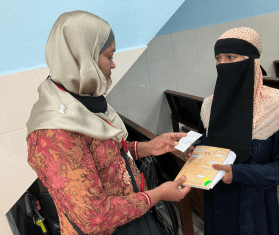*Data from MSF International Activity Report 2023

Malaysia 2019 © Arnaud Finistre
Malaysia
Providing medical and humanitarian support while advocating for Rohingya refugees facing deterrence-based policies.
Rohingya are at risk “wherever we go, whether Myanmar, Thailand, or Malaysia”
October 2, 2024 - In Penang, Malaysia, Doctors Without Borders/Médecins Sans Frontières(MSF) provides medical, mental health, and humanitarian assistance to refugees, majority of whom are Rohingya people.
Read more
Our work in Malaysia
In Malaysia, Doctors Without Borders/Médecins Sans Frontières (MSF) provides medical and humanitarian support to refugees, mainly the Rohingya, who face multiple barriers in accessing health care and protection in the country.

What's happening in Malaysia?
More than 4,400 Rohingya refugees attempted to make perilous boat journeys from Bangladesh or Myanmar to Malaysia in 2023, an increase of over 20 percent in comparison to 2022.
The Malaysian government’s deterrence-based policies against refugees include immigration raids and arrests, detention, discrimination, and deportation. Many children are still held in immigration detention centers with adults, despite calls for alternative accommodations. Some have been transferred to dedicated detention centers for mothers and children, but to date there is no alternative to detention.

How we're helping in Malaysia
MSF teams work in urban refugee settings and immigration detention centers, and through fixed and mobile clinics in Penang, offering general health care, mental health support, and patient referrals to other health providers and the UN refugee agency, UNHCR. Due to our efforts, hepatitis C treatment is now provided free of charge to all refugees registered with UNHCR in Malaysia.
In the three immigration detention centers where we work, we provide medical and psychosocial care and distribute essential hygiene items, such as soap and sanitary pads. We also conduct training on medical and mental health topics for immigration officers. In 2023, our teams saw a high demand for prenatal care and family planning services.
Advocacy is a key part of our program in Malaysia, primarily through engagement with government stakeholders. We continue to oppose the detention of refugees in immigration centers and call for them to be issued with identity documents so that they can obtain health care insurance and greater protection in the country. We also advocate for free access to vaccinations for all children in Malaysia.

How we're helping
16,600
Outpatient consultations
5,380
Prenatal consultations
1,390
Individual mental health consultations
More news and stories
Learn about MSF’s journalistic roots and our commitment to bear witness and speak out about the plight of the people we treat.

Story Oct 02, 2024
Rohingya are at risk “wherever we go, whether Myanmar, Thailand, or Ma...
Read moreLearn about MSF’s journalistic roots and our commitment to bear witness and speak out about the plight of the people we treat.





